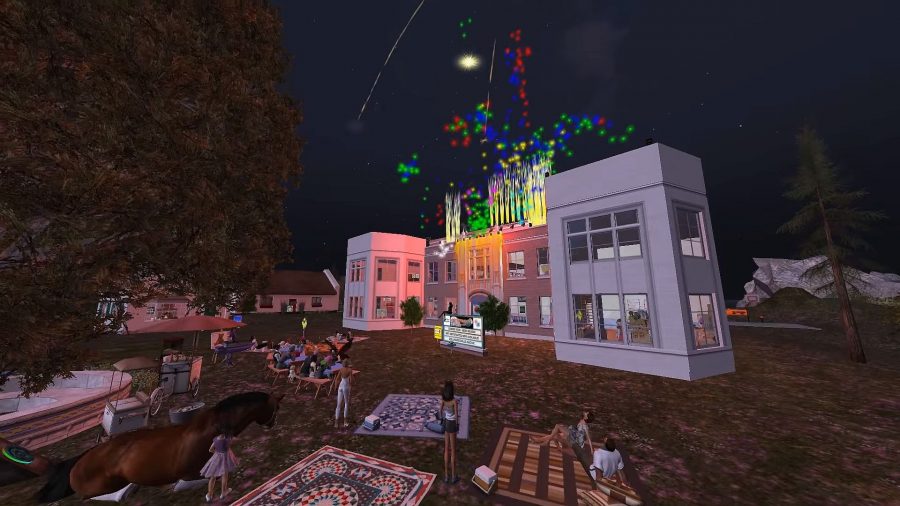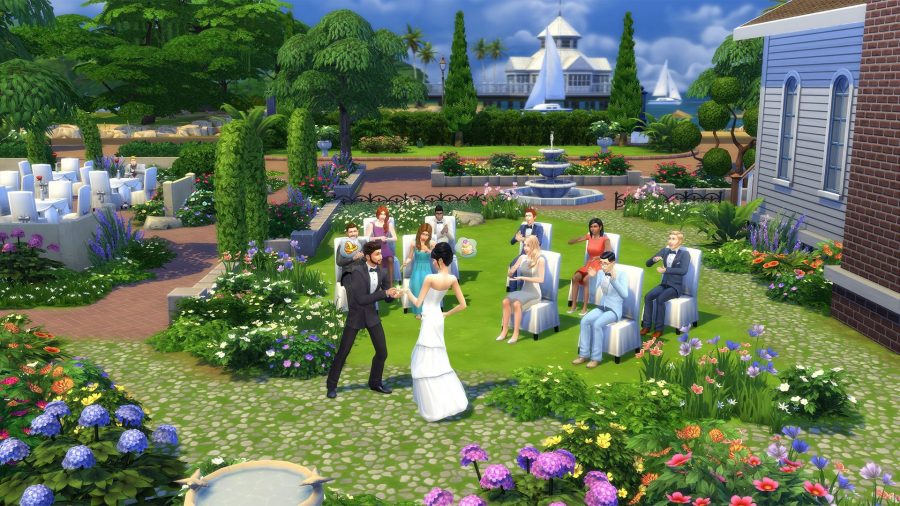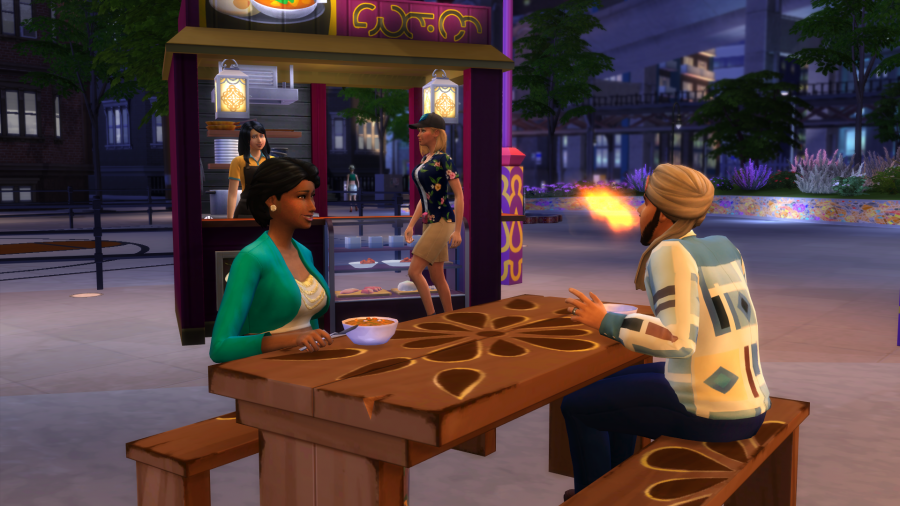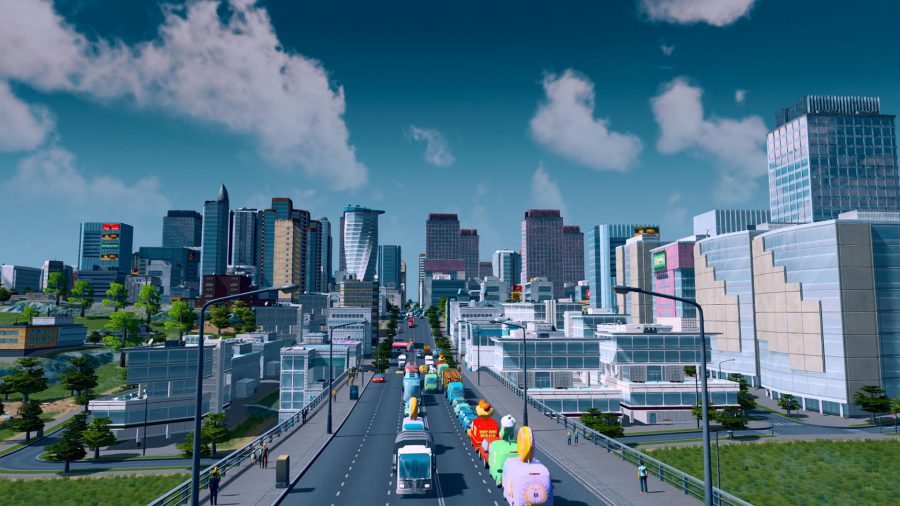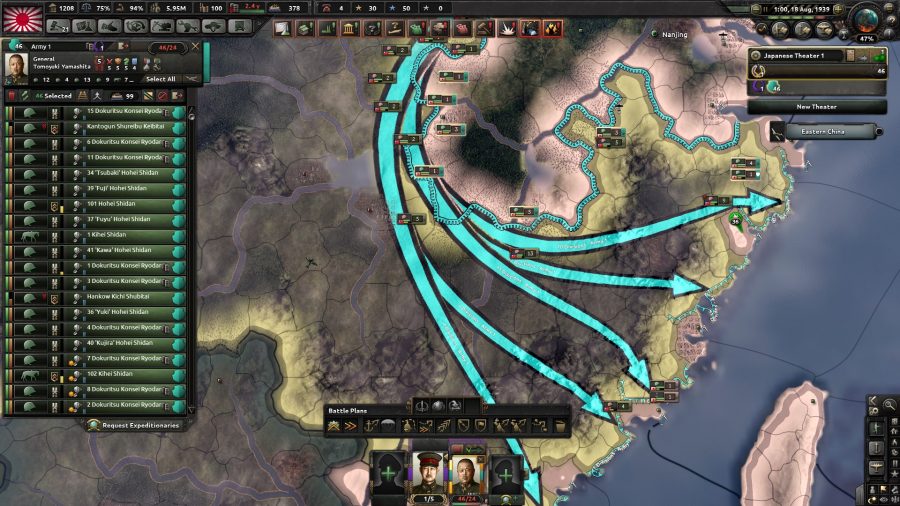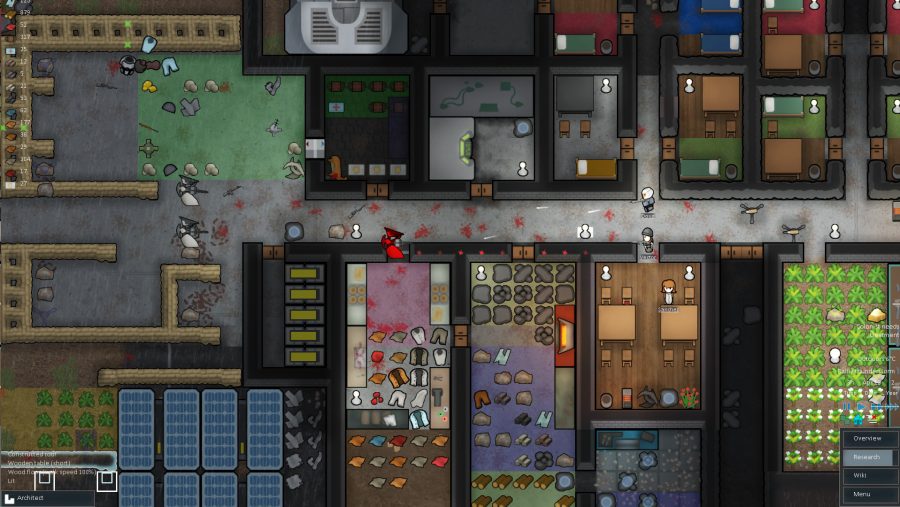Rod Humble is a former executive VP at EA, where he led development on The Sims 2 and 3, and former CEO of Second Life creator Linden Lab. When it comes to open-ended, systems-driven sandbox games, it’d be fair to say he’s one of the most experienced designers in the business.
His latest job is head of Paradox Tectonic, a brand new studio that the rapidly growing publisher, generally known for its information-dense management and grand strategy games, opened about a year ago in California. Tectonic’s brief is to create “open, fun, beautiful games” that enable “freedom, emotion, and sharing.”
It’s not, at first glance, the most obvious marriage. I don’t have the data for audience overlap between The Sims and Hearts of Iron IV, but I’m going to go out on a limb and say the venn diagrams are pretty far apart. And yet there are hints in that studio brief, and in the open-ended nature of many of Paradox’s games, that for this publisher to make the next big life simulator would actually make a hell of a lot of sense, given its success and clear ambition.
Not that Humble is able to confirm explicitly that that’s what he’s doing. Paradox hasn’t announced his project or spilled any real details and I know better than to try to nail him down – though he does say “it’s pretty obvious” given his career to date. What follows is a strange interview in that we have to talk around his game, but a fascinating one that’s full of insights about how games like this are made, and tempting tidbits about what may be Paradox’s forthcoming take on them. Or a fishing simulator. One of the two.
PCGamesN: What can you tell me about your game that won’t get you fired?
Rod Humble: We’re mirroring what Paradox is about, which is making games that respect the intelligence of the audience, and which also embrace mods. Although mods can sound kind of scary sometimes, what it means is creativity and openness. So our game mirrors that philosophy, and it’s very much what our studio, Tectonic, is dedicated to in all our projects.
Paradox also increases the scale and the scope of the subjects that they’re addressing, and we’re doing that as well. We’re trying to make a very vast experience in which, hopefully, people will find and create beauty. Players create beauty in Paradox’s games all the time – from Cities: Skylines to Stellaris, where it’s about how you build your empire, to Crusader Kings where you’re telling these beautiful stories.

Paradox also makes games that you can’t really win. Like, there’s no way you can win a game of Crusader Kings, by, say, painting the whole map. That just isn’t going to happen. And you can’t really lose either, because there’s always a dynasty – in fact sometimes ‘losing’ is really fun because you get ‘oh, my country’s broken up’. In that space, then, our job is to give players a lot of mechanics to really sink their teeth into, to just make it really interesting for them to drive the experience themselves and go and tell their own stories.
The other thing we’re trying to do from a gameplay perspective is make a very, very deep game. In fact, maybe the deepest game I’ve ever worked on, because I really wanted to add a large amount of gameplay to the subject and the genre I’m approaching. I think it’s due. My hope is that people will play with the mechanics, and the further they dig, they’ll uncover more mechanics – like, ‘Oh, I can’t believe I can do that!’ and that there’s a little mechanic to support it, you know?
That feeling of stumbling across a secret or an easter egg is nice, but to stumble across a whole mechanic that hadn’t been advertised – that’s pretty rare. Are they easier to create than we think?
It’s really hard! It’s really hard. But, you know, I’ve been at this for a while, and I’ve thought for a fairly long time about this project. And it’s coming along, it’s working so far. It’s about making sure that the inputs and the outputs of each mechanic can interlock with other mechanics, hopefully to create emergent and interesting results. So yeah, it’s very difficult, it’s like a highwire balancing act of design.
But we’re aiming to make the deepest, most gameplay-rich entry that’s ever been made within the space we’re aiming at. The way we’re doing that is when you [drill] down, there are new gameplay mechanics that you can discover, depending on which direction you push. Discovering an entire set of gameplay mechanics, based on a path that you’ve chosen previously, is a delight, and we’re trying to really emphasise that.
For example, I’m looking out of the window here [in Berlin]. Let’s say we’re playing an open world game, and you walk down to that river and decide to take up fishing, and you discover there’s this whole bunch of fishing mechanics like 40 levels deep. Then you might walk back here and you’re like, ‘oh, I’m gonna paint this building’, and you discover, oh my goodness, there’s this massive layer of mechanics just supporting your ability to explore how you want to be a painter. That, to me, would be really exciting.
Isn’t that an incredible amount of work? People make entire games solely about fishing simulation. How on Earth do you do it?
You’re right, people make entire games about fishing simulators, but if you aren’t interested in fishing, then that’s never gonna bother you. It would bother me, because I’m the guy who will have to program it, but if as a developer you’re willing to accept that some players just won’t touch these mechanics, then that’s okay. That means that players can then just explore this vast array of mechanics, which hopefully are very deep as well, and pick and choose the ones they’re going to enjoy.
There are also repeatable patterns that we can do. And that’s standard stuff from RPGs, that’s too templated. We’re trying to get a deeper model. But you’re right, from the players’ perspective, if they had to navigate the lowest [depths] of the UX, then that’s very complicated, but again, if you can make the UX more appreciable by human beings, if it’s intuitive, if you don’t have to do a tutorial, then that’s always good.
For more emergent gameplay: see the best sandbox games on PC
But how are you able to program all of that functionality?
There are various ways that we’ve done that – with object-oriented programming, obviously, we can pick and mix and then we can add content within a large mechanic, but actually, the code might be similar, or the same, or derivative [of something else]. So one whole segment of another mechanic, we can – I don’t want to say reuse, but there are patterns that we could reuse. So putting those patterns and commonality which was intuitive, that’s the way we program. That’s how we make it. It’s about player patterns.
So you’ve programmed the ability to, say, throw a rock, and you take some of that code and extend it to throwing a fishing line? It’s about finding those synergies?
Yeah, and going in from day one knowing that our aim is to make a very, very gameplay-rich game.
I don’t think he’ll mind me telling this story in an interview – when I took over the Sims, I went to visit [Maxis co-founder and Sims creator] Will Wright. I was taking over his baby, so I wanted to go and kiss the ring. And he’s a great guy, but I asked him what I thought was a smart question, which was, “looking back, what’s the one thing you would take away [from the Sims]? What’s something you regret putting in that wasn’t needed, or the game would be more efficient without?” And he looked at me like [bulldogs do], with this sort of pitying look, and he said “I wouldn’t take anything out. I would add more. More is more.” The idea of taking away gameplay didn’t even occur to him.
Are you worried that as you add mechanics and content, all those interactions are going to stack up and create an exponentially growing workload?
Exponentially growing content, yes, but workload, the aim is for that to be none, though intellectually and practically that is the danger. You don’t want the player to have to think about too much stuff at the same time – a game shouldn’t feel like a chore, or that’s not something that I think is for our game. For some games, plate-spinning is great, but we’re trying to avoid that sense of ‘I need to keep X going’. It gets a little much for me.
I would far sooner that people are looking forward to it, like ‘I want to go and do this because it’s fun, but I could have done these ten other things’. The problem I want them to have is like they’re stuck in the middle of the fairground, like ‘ahh I want to go and play that’, as opposed to, ‘you must earn the right to have fun’, which is what [chores do].

Presumably it’s also difficult to signal to players what results to expect when interacting with these elements and creating that emergent gameplay. How do you approach that challenge?
A lot of it is helped when it’s something that’s relatable to our lives, you know? There’s a generation now that’s completely comfortable with – my daughter, for example, can take a photograph, and almost immediately she can edit it, manipulate it, share it, and people will appreciate it online through Instagram, or wherever it is. If I were to describe those mechanics, without you knowing Instagram, you’d have no idea about making digital images, this child doing post-processing effects, and then [posting] to some online service.
A lot of it is also UX design and flow. Today I was talking about how good human beings are around cognitive load. When you find bad game mechanics, in my experience, it’s because they’re over-emphasising the cognitive load too early on and you get analysis paralysis, to use that term from board games. So I want our decision space to have very few fail states – it’s consequence-free. That way you can play with those mechanics as opposed to worrying about how to decipher, like, the UI. I think UI and UX are very important.
Human beings are very good at certain things, way better than computers are, and visual thinking is one of them. You can give a human being a [picture made of a] thousand photographs of individual faces, have them look at it for just one second, and then 80% of people will, if you show them those faces a week later, will have almost 90% of recognition and a feeling of ‘I’ve seen that person before’. It’s an experiment that’s been repeated, and it’s amazing, it’s absolutely amazing that we can do that.
For more player creativity: check out the best Sims 4 mods
So when you’re designing UX, lean on visual stimulus versus the analytical, or even worse, lots of numbers, buttons, and sub menus.
It’s strange to hear someone making a Paradox game be dismissive of numbers, buttons, and sub menus.
Yes! But think of Cities: Skylines. I have an image of the city [as I play], and right there in that single screen there are over 300 decisions you could make immediately, because of course you have those UI options, but you can also click on any single building. And yet, Cities: Skylines is a relaxing game. Why?
In my opinion, it’s because if you make the ‘wrong’ decision, it doesn’t really matter. If I click on the wrong building, or build something I don’t need, well, okay, I’ll just delete it. If I need more money, I’ll just get some more money. If it’s on a harder rule set it’s more complex, but even with the very complex games it comes back to that visual way of appreciating data. So with Crusader Kings or Europa Universalis, I’m always drawn to the map. I love to see all those different overlays, I find rare beauty in accessing all that and digging in.
And even those games’ sub menus aren’t overly confusingly deep. There are some which are, like Hearts of Iron, and that’s part of the fun. Like: ‘I’m gonna analyse the shit out of this supply chain, I’m going to really get my teeth into the operational aspects as well’. So there can be a joy in heavy cognitive load, too, with lots of menus – it’s not always a bad thing.
You mentioned games you can’t lose earlier. Do you think some people need fail states and negative motivation to play games?
I respect the customer’s choice. I don’t [need fail states]. I think that the kind of games I make generally won’t punish you for failing. In fact, the idea – particularly with our new project – is when you hit a fail state we’re going to give you an opportunity to see a really cool story, so you might even want to try and engineer a fail state, just because it’s really cool and it will open up new gameplay. It’s a matter of taste. I certainly respect people who love, say, Dark Souls, who really want that challenge. That’s my son – he loves that game.
For more grand schemes: see the best strategy games on PC
No game over screens then?
No, definitely not. Yeah, 100% not. Unfortunately, if I gave you examples of what I’m working with, it would give the whole thing away, but I can talk about other people’s games. Rimworld does this very well – say somebody goes crazy, which happened to me, someone in my colony just took a knife and cut her own bunk bed to bits. And I’m like, ‘this is really fun’. Clearly she’s a psycho, but now she’s my warrior, because she’s got that ability.
So if you can imagine that – although, maybe that type of violence wouldn’t be what I’m looking for – but the idea is that this is what might be traditionally regarded as a problem, but actually, it can be turned into a real opportunity, not only for storytelling, but also for gameplay. Tynan [Sylvester], the guy who wrote Rimworld, did a very good GDC talk on how he designed it to be a set of storytelling opportunities. It’s really well worth watching.
One doesn’t immediately associate Paradox with things like the Sims or Second Life. Does this project feel like a natural step forward for the publisher?
They’re the kinds of games I’ve worked on, regardless of genre, and – well, you could say we haven’t announced the genre yet – but yeah, it all kind of fits. I think people who are familiar with my work will be like ‘ok, that kind of makes sense – hopefully he’ll polish it a bit better this time!’ Hopefully they’ll be pleasantly surprised.
When might we hear more?
I’ve been told to officially say ‘soon’. It’s not going to be years down the road, so: soon.

